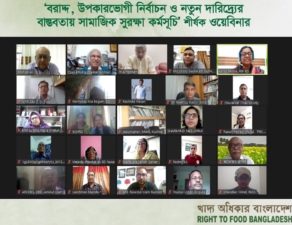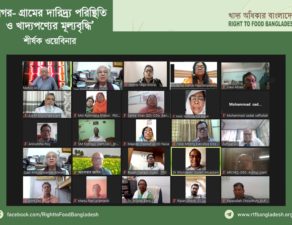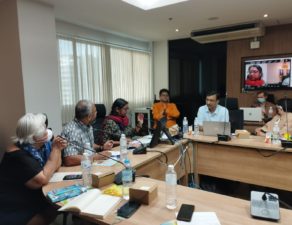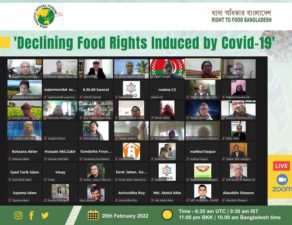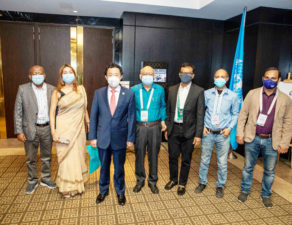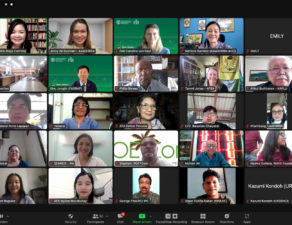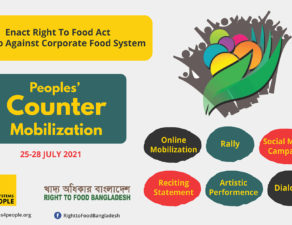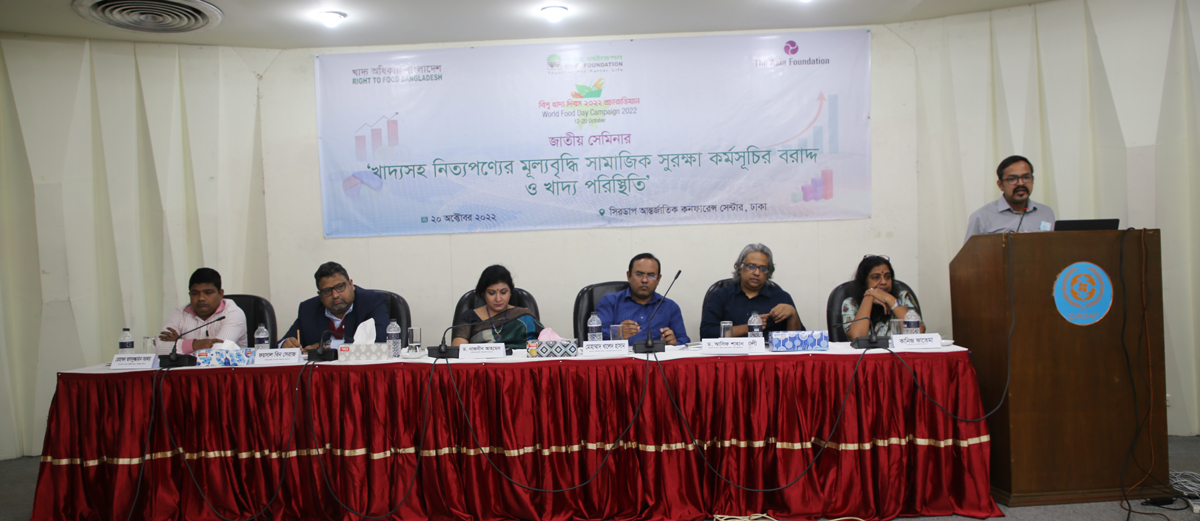
On October 16, ‘World Food Day’ was celebrated worldwide. Around the day, Right to Food Bangladesh’ Network organized several programs under ‘World Food Day 2022 Campaign’ from 12-20 October. As part of the programme, a national seminar on ‘Price Hiking, Allocation of Social Security Programs & Food Security’ was held on 20 October 2022 at the CIRDAP International Conference Center in Dhaka under the initiative of Right to Food Bangladesh Network, WAVE Foundation and The Asia Foundation. Mohammad Khaled Hasan, Joint Secretary, Cabinet Division, Government of the People’s Republic of Bangladesh, attended the seminar as guest of honour; Kazi Faisal Bin Seraj, Country Representative, The Asia Foundation; Dr. Nazneen Ahmed, Country Economist, UNDP Bangladesh and Mohammad Asaduzzaman Sarker, Deputy Chief, General Economics Division, Planning Commission. In the light of the research, the main article was presented by Dr. Asif Mohammad Shahan, Associate Professor, Department of Development Studies in Dhaka University. Kaniz Fatima, Coordinator of Right to Food Bangladesh Network and Deputy Director of WAVE Foundation conducted the entire program, including the opening speech at the national seminar. In the speech of the honourable guest in the discussion, Mohammad Khaled Hasan said, “According to the information on the Global Hunger Index, we are currently at risk. But our overall position is comparatively better than many other countries. Kazi Faisal Bin Seraj said, “An inclusive process is essential for a sustainable future economy, where transparency and accountability will be guaranteed.” That’s why the government should take multifaceted measures to reduce the number of urban poor at the same time. Dr. Nazneen Ahmed said, ‘Infrastructural development of slum areas is important for the urban poor, but if you want to take initiative in this case, you have to face multifaceted challenges. In order to eliminate the urbanization of the urban poor, the government, NGOs and related parties should arrange mass employment in rural areas. At the same time, if special attention is given to increasing income, people’s purchasing power will increase, which will solve many problems. He also mentioned that special attention should be given to the production, storage and consumption system for the development of the overall food security system of the country. Mohammad Asaduzzaman Sarker said, “The current government has several goals to deal with the poverty situation of the country and for that purpose the government is conducting multi-faceted activities. As a result the per capita income of the people is increasing. Meanwhile, the mid-term evaluation of social security programs has been completed by the government. The results of which will play an important role in improving the quality of the program. Dr. Asif Mohammad Shahan said that due to the impact of Covid-19, the lives of people in urban and rural areas are at serious risk. The country’s social security program is playing an important role in mitigating this risk. At this time, the total GDP expenditure on the social security program is shown graphically, even if the scope of the social security program does not increase, the nutrition and food security system of the poor to the middle class of the country is at a great risk. In this context, the findings of the study and the recommendations that emerged from the discussion of various representatives of the civil society are – social security programs should be tailored to the needs of the urban poor; To reap the benefits of digitization that has started in the beneficiary selection process of social security programs, there is a need to increase knowledge and skills among the general public; NGOs should continue to campaign for the right of the minorities in the plains to receive social security programs; Grievance redress mechanism should be implemented by the government with the help of NGOs.


